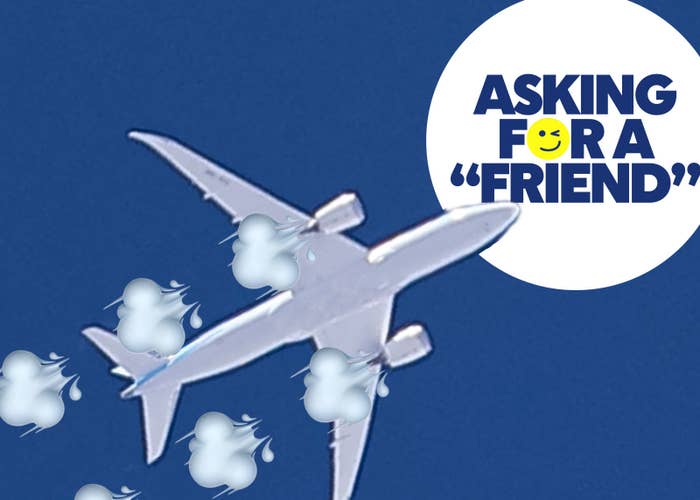
Asking for a Friend is BuzzFeed News’ health advice column. Ask us anything about your body! If you're too afraid to google or too embarrassed to ask a friend or family member, let alone a doctor, submit your questions here.
Dear Asking for a Friend,
Every time I fly on airplanes, I tend to get major stomach cramps, bloating, constipation, and gas. It can be very painful on long-haul flights — as well as embarrassing! I’ve tried drinking lots of water, as well as taking rehydration tablets and anti-flatulence medicine, but nothing seems to work. What is it about flying that is doing this to me? And what can I do before, during, and after a flight to treat it?
—Constipated Flyer
Dear Constipated Flyer,
Let’s get the obvious out of the way: We’ve ALL been there.
Few things in life are more embarrassing than failing to suppress or muffle a fart while sitting inches away from strangers on a packed flight, gas reverberating off the seat and wafting into unlucky noses.
But there’s also nothing more truly universal than the sometimes mortifying but always essential inner workings of our gastrointestinal tract — especially while traveling.
“We all pass prodigious amounts of gas every day, whether we want to admit it or not, and your body will get it out one way or another,” said Dr. Kyle Staller, a gastroenterologist at Mass General and assistant professor of medicine at Harvard Medical School. In fact, humans fart between 8 and 13 times a day.
“You can imagine that if your gut is under stress and its rhythm is thrown off, you may be less effective at moving that stuff from one end of the gut to the other,” Staller said, “so you're more likely to get bloated and feel discomfort.”
Travel in general is known to make people feel constipated, bloated, and gassy. The phenomenon mostly has to do with changes to daily routines, including meal times, sleeping patterns, stress levels, hydration, and exercise schedules, which may have a greater impact on people with certain medical conditions like irritable bowel syndrome (IBS) or Crohn’s disease.
Less studied and discussed are feelings of constipation and bloat during a flight. For the most part, the same factors that can cause general travel-related gut issues can also cause those that occur while on a plane, but flights themselves do bring some additional issues, according to Dr. Eamonn Quigley, a gastroenterologist at Houston Methodist Hospital.
For starters, sitting down for long periods of time doesn’t support regular bowel movements, Quigley said, which is why people with sedentary lifestyles tend to struggle more with constipation than more active people do.
In a normal scenario, your colon (also known as your large intestine) absorbs water as food passes through it, forming the waste products we call poop. A series of wavelike contractions of the GI tract called peristalsis then push that poop to your rectum, alerting you it’s time to go to the bathroom. This is why many people need to go number two in the morning, right after eating a meal, and even during exercise; movement cues the colon to get going.
For some people, however, long bouts of inactivity can make the contractions slow or sluggish, causing the colon to absorb too much water, making your stool hard and dry, and leading to constipation.
It’s possible, too, that the low-pressure environment in airplanes can contribute to stomach discomfort. “Even though cabins are pressurized, they are not at the atmospheric pressure that we are accustomed to, and this can contribute to bloating and gassiness,” Quigley said, because when pressure decreases, the volume of the gas in your GI tract increases. (If you’ve ever noticed a plastic water bottle expand in flight, you get the concept.)
As logical as that reasoning sounds, Staller said it hasn’t actually been studied and might be "overstated," although it can help explain your crampy, gassy flights. However, it’s more likely that your gut just doesn't handle gas as it normally does while flying 35,000 feet in the air.
Like every other system in the body, the organs that make up the digestive tract have their own circadian rhythms that don’t adapt to disturbances all that well. Traveling for long periods of time and to new places is associated with a host of changes to your routine that, one by one, make your gut’s body clock a little loopy, Staller said, especially if you cross time zones.
One of the biggest factors in this cycle is the food you eat. Airport dining is mostly fast food, and in-flight snacks are usually salty pretzels or sugary cookies or just something outside your norm. Not to mention, some of the new foods you eat during your travels may inherently produce more gas than you’re used to.
“You’re producing more gas because you’re eating things that you’re not used to and that you may not tolerate as well, and you’re also not moving that gas out as efficiently,” Staller said. “All these things can be triggers for the sensitive nerves in your gut. It’s a perfect recipe for GI distress.”
Dehydration is another key player in stomach issues during flights. On the go, people tend to drink less water and more coffee or alcohol, which are both diuretics, meaning they stimulate urine output and rid your body of excess water, Staller said. Airplanes are also dry environments that may contribute to dehydration.
“That can certainly cause constipation, especially in people who might be prone to constipation and are right at that threshold and not much will push them over,” Staller said.
Then there’s stress. Have you ever needed to run to the bathroom right before a performance, a big test for school, or even a short flight? That’s because “your gut and brain are very intimately connected,” Staller said. Although stress is never the sole cause of GI symptoms, it certainly acts as “volume control” that can exacerbate symptoms of gassiness, bloat, or constipation.
“You may not be concerned or anxious about flying, but the whole experience is a stress, and sometimes, as a famous book said, your body can keep the score, even though you are maintaining and functioning at a high level without a lot of drama,” Staller said. “Your body can still feel that stress and react to it, especially for people with IBS.”
And let’s not forget the fact that “airplane bathrooms freak many of us out,” Quigley said: “Trying to go to the bathroom in a tiny space as the plane goes through turbulence and someone else is knocking at the door is not conducive to an effective bowel movement!”
Some of the advice to avoid an aggravated gut while flying are obvious: avoid alcohol, drink lots of water, and minimize caffeine intake (although Staller said that caffeine can sometimes be helpful in driving a bowel movement). You’ll want to do this in the days leading up to your flight, as well as during the trip.
It’s important to know your body, too. If you’re prone to constipation, Staller said you can try taking a fiber supplement or mild laxative a day or two before your flight to get ahead of the discomfort (depending on how long your flight is, of course; you don’t want to have explosive diarrhea in those tiny bathrooms).
Speaking of diarrhea, if airplanes give you the runs, you can experiment with taking an anti-diarrheal medication several hours before boarding. And if you gotta go, you gotta go. Don’t hold back any bowel movements. You’ll just back the pipes up even more.
“Be proactive, not reactive,” Staller said.
Once you’ve arrived, you may want to tread carefully when acclimating to the new environment, especially if you crossed time zones.
“The tendency when we get to a new environment is to really lean into it by trying all the new foods and things like that,” Staller said. “But the better part of valor may be eating a little bit more cautiously when you get there and sticking to something more similar to your home diet, rather than jumping in and eating the local food right away. I can't say I follow that advice myself, but I think that that could be helpful.”
But what if nothing works?
Well, Constipated Flyer, if none of these tips helps you during your next flight, it may be comforting to know that there’s really no magic solution FOR ANYONE that will give them the power to defy nature (consistently at least), although the steps mentioned above can certainly help reduce the severity of symptoms.
Passing gas, as painful as it can be, is actually a sign of a healthy gut. Next time you’re wiggling around in your seat to hold a fart in (which BTW never works; it’ll leak out eventually) or ease discomfort, just remember everyone around you is likely doing the same.
